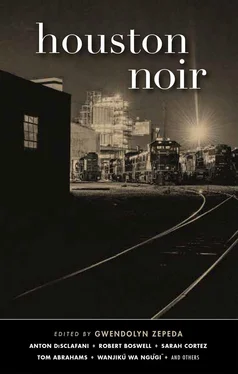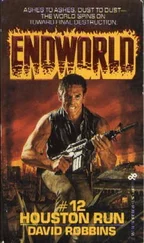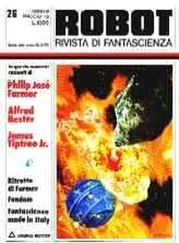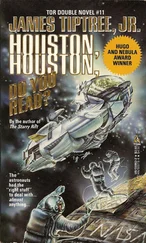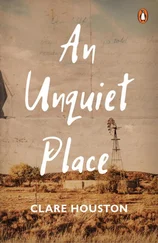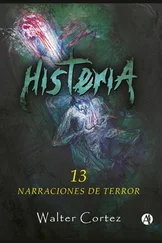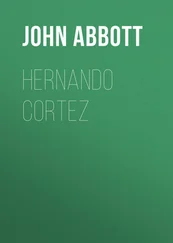Sarah Cortez - Houston Noir
Здесь есть возможность читать онлайн «Sarah Cortez - Houston Noir» весь текст электронной книги совершенно бесплатно (целиком полную версию без сокращений). В некоторых случаях можно слушать аудио, скачать через торрент в формате fb2 и присутствует краткое содержание. Город: New York, Год выпуска: 2019, ISBN: 2019, Издательство: Akashic Books, Жанр: Детектив, на английском языке. Описание произведения, (предисловие) а так же отзывы посетителей доступны на портале библиотеки ЛибКат.
- Название:Houston Noir
- Автор:
- Издательство:Akashic Books
- Жанр:
- Год:2019
- Город:New York
- ISBN:978-1-61775-706-8
- Рейтинг книги:3 / 5. Голосов: 1
-
Избранное:Добавить в избранное
- Отзывы:
-
Ваша оценка:
- 60
- 1
- 2
- 3
- 4
- 5
Houston Noir: краткое содержание, описание и аннотация
Предлагаем к чтению аннотацию, описание, краткое содержание или предисловие (зависит от того, что написал сам автор книги «Houston Noir»). Если вы не нашли необходимую информацию о книге — напишите в комментариях, мы постараемся отыскать её.
Houston Noir — читать онлайн бесплатно полную книгу (весь текст) целиком
Ниже представлен текст книги, разбитый по страницам. Система сохранения места последней прочитанной страницы, позволяет с удобством читать онлайн бесплатно книгу «Houston Noir», без необходимости каждый раз заново искать на чём Вы остановились. Поставьте закладку, и сможете в любой момент перейти на страницу, на которой закончили чтение.
Интервал:
Закладка:
“I think the killer is Jake,” Jules said. Jake was a guy who recently stopped coming to the 2:30. The word was that he’d relapsed. “Remember he works at Home Depot? He probably carted her body to the recycling center in that Home Depot cart I saw dumped in the ditch yesterday. I pass by that ditch every day and always look at it. That cart wasn’t there before the body was in the dumpster.”
Kelly laughed hard at her theory, accidentally blowing smoke in her face. “Girl, there’s Home Depot carts in every ditch and bayou in this city! First off, no perp is gonna take that kinda time. Trust me. I know perps. What you got against Jake, anyway? And Christ on a bike! Why you always looking down a ditch?”
“How do you know he didn’t do it?” Jules asked. “You always tell me to watch out for people with clay feet.”
“First of all, Jake ain’t got no clay feet, because them’s that do gotta be uppity types — you know, people that looks high but aims low — and Jake ain’t uppity. Second of all, I know Jake; he’s good people.”
“Well, I don’t know. I just have a feeling about him.”
“What — he stare at your titties more than the rest of us?”
Dan, the leader of the 2:30 meeting on Wednesdays, arrived in his suit and tie, looking every bit the lawyer. He never said what he did for a living, and neither Jules nor Kelly ever asked. People in AA didn’t ask each other that kind of stuff. Everyone was happy to just show up at the club for another day sober. “Keep coming back,” they said at the end of each meeting, holding hands. “It works if you work it.”
When Jules wondered aloud why Dan always led the 2:30 in a suit, Kelly answered, “He’s faking it — faking it to make it.”
Dan stopped by the picnic table on his way into the meeting. He smelled good. Jules recognized the Comme des Garçon Wood-something-or-other her ex used to wear.
“What are y’all yakking about?” Dan asked.
Kelly took a drag off his Camel and turned his head to blow the smoke to the side, away from Dan, but he kept his eyes on Jules.
Jules said, “About the girl’s body they found in the Westpark Recycling dumpster yesterday.”
“God,” Dan drawled, “that’s a grisly thing, isn’t it? I heard about it on the news last night.”
“I think the body was dumped outta this Home Depot cart I saw in the ditch yesterday,” Jules said. Kelly kicked her under the table.
“What does that cart tell you?” Dan asked. He had a knowing tone in his voice.
“That some homeless dude or some Mexican did it,” Kelly cut in. “Those are the sorts always stealing shopping carts.”
“Hey,” Jules said, “I know you don’t know this, cabrón, but I’m Mexican.”
“Ho!” Dan laughed. “Don’t step on the toes of your fellows; they’ll retaliate!”
“You’re not Mexican,” Kelly said. “What kind of Mexican are you ?!”
“The Mexican kind,” Jules answered. It wasn’t worth going into it with him. Like everyone else, he wasn’t going to believe her — because of her strawberry-blond hair, her blue eyes, her pale skin. Only Mexicans seemed to know that not all Mexicans looked alike; not all of them had brown or black hair, brown or black eyes, and brown skin.
“Anyways,” Jules continued, “those guys walking back and forth along that ditch? They’re Salvadorans.”
“Now how would you know that?” Kelly said.
“Ricas pupusas,” Jules said, referring to the handwritten neon poster she passed every Sunday on her way to the Triangle Club. Families from Windswept ambled along the ditch’s dirt trails to the parking lot of St. Michael’s Academy, where they lined up to buy these homemade savory stuffed-corn tortillas. Jules stubbed out her cigarette and stood. “Salvadoran comfort food,” she said, blowing smoke straight into Kelly’s face.
She left him sitting by himself and entered the door held by Dan, who’d pulled it open for another woman. Jules had never seen her before, this girl of maybe twenty-two, wearing a spaghetti-strap camisole, jeans ripped at the knees and studded with rhinestone butterflies.
For the past four months, Dan had been leading the Wednesday 2:30 open-discussion meetings. Daily attendance at 2:30 meetings ranged from four to fifteen people. The hotter it was outside, the more people in the small, windowless room. While other meeting leaders read from Alcoholics Anonymous: The Big Book , or from the daily meditations in Twenty-Four Hours a Day , on Wednesdays with Dan, the topic was always the same: alcoholism.
Halfway through the meeting, when Dan passed the basket, Jules dropped in her two dollars, then handed it to Kelly, who looked at her, shook his head and grumbled, “You’re not Mexican.”
“Kelly?” Dan called on him. “You wanna share?”
“Um, uh,” he passed the basket without putting money in it, “I’m Kelly, and I’m an alcoholic.”
“Hi, Kelly,” the group chorused.
“I, uh, I think I’m just gonna listen today.” He folded his hands on top of his belly and grimaced at Jules.
After the meeting, while Kelly was in the restroom, Dan approached Jules.
“Grab a coffee with me.”
Shocked, Jules hesitated. She and Dan had never exchanged any type of back-and-forth before. “I’m waiting for Kelly,” she said.
Dan smirked, laughed. “Oh.” She could tell he had the wrong idea.
“We’re not together, me and Kelly. I was just gonna say goodbye.”
“Okay. Meet me at Starbucks on Hillcroft and 59,” he said and walked out the door.
“Come on, come on.” Jules banged on her steering wheel as she waited to turn left onto Westpark. Not far north, Hillcroft turned into Voss, and the dilapidated apartment complexes of Woodlake and Briar Meadow gave way to the seventies single-story mansions of Piney Point. But here, amid the thicket of electrical transmission towers and the sooty skein of overpasses and underpasses, a single-family dwelling would likely incinerate under the scalding sky. The only habitable enclaves in the immediate vicinity were one hundred — to three hundred — unit apartment complexes, one of which was the Falls of Westpark, a phlegmy stucco building that Jules passed each day on her way to the club. The Falls’ walkways faced the road, open to the air but shrouded in shadows. One whole flank of the building rubbed against the cindery bulk of State Highway 59. Jules suspected most of its inhabitants were the day laborers who loitered in the shade of the 59 underpass, waiting for jobs. Every time she drove past the Falls, she stared at its dim walkways and wondered what the people who lived there felt, what they hoped for, how they dealt with all the noise and exhaust from the freeway. She noted a few children’s plastic toys through the grills bordering the walkways. Maybe some of the day laborers had families with them, wives or mothers or sisters who worked as nannies and/or housekeepers for families in Piney Point, Uptown, Hunter’s Creek, River Oaks.
Since she’d broken up with her ex, Jules was all alone in Texas, family-wise. She’d moved to Houston seven years prior from Seal Beach, California, to attend Rice University on a diversity scholarship. Her plan had been to graduate with an English degree and return to the West Coast for law school, but she’d ended up getting serious with Larry. They’d met when she started working weekends at the Signature Kroger for extra cash; he was her manager. With only six hours left until graduation, she took a break from school and moved in with him. During this time, her drinking progressed to the point of her blacking out nightly and throwing up each morning. Within the year, Kroger had fired Larry, he had kicked Jules out of their shared apartment, and she had become a full-time cashier to pay her own rent. Going back to college, even though she was nearly finished, seemed beyond her physical and emotional capacities.
Читать дальшеИнтервал:
Закладка:
Похожие книги на «Houston Noir»
Представляем Вашему вниманию похожие книги на «Houston Noir» списком для выбора. Мы отобрали схожую по названию и смыслу литературу в надежде предоставить читателям больше вариантов отыскать новые, интересные, ещё непрочитанные произведения.
Обсуждение, отзывы о книге «Houston Noir» и просто собственные мнения читателей. Оставьте ваши комментарии, напишите, что Вы думаете о произведении, его смысле или главных героях. Укажите что конкретно понравилось, а что нет, и почему Вы так считаете.
